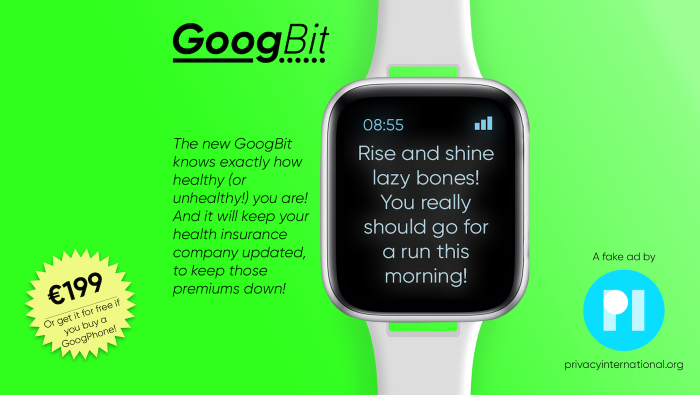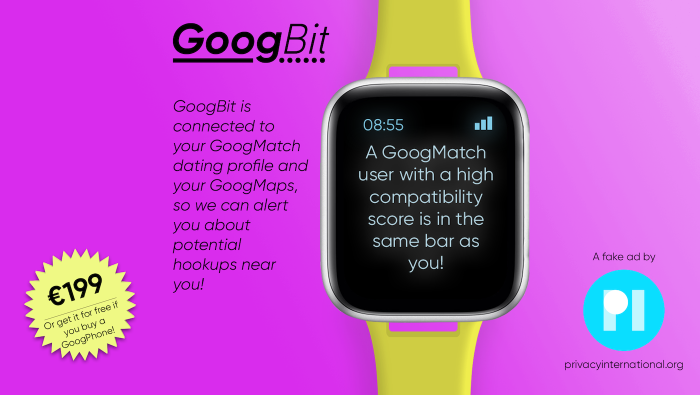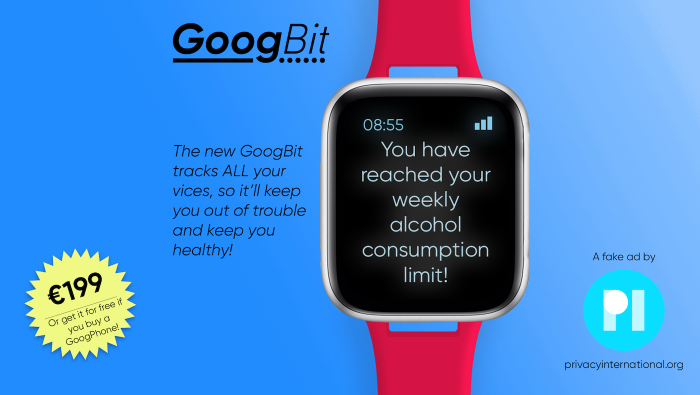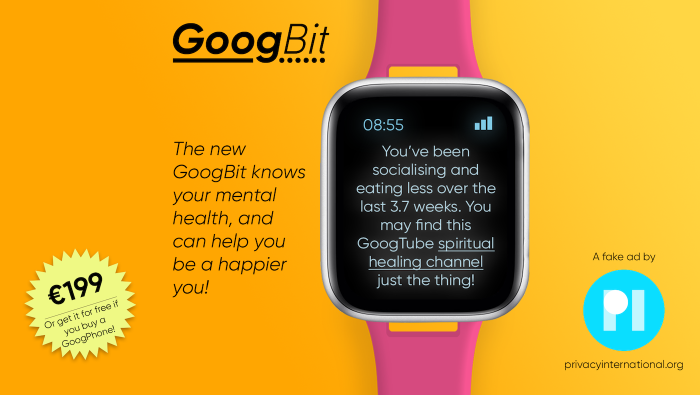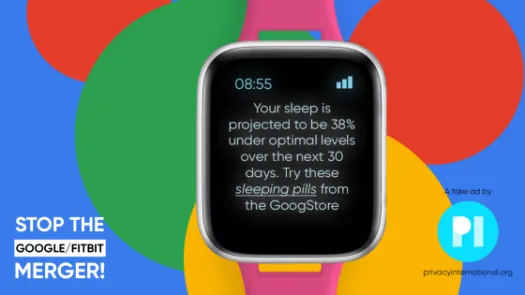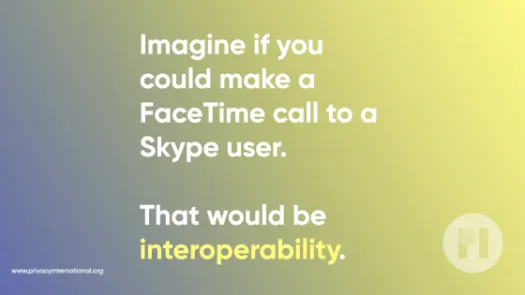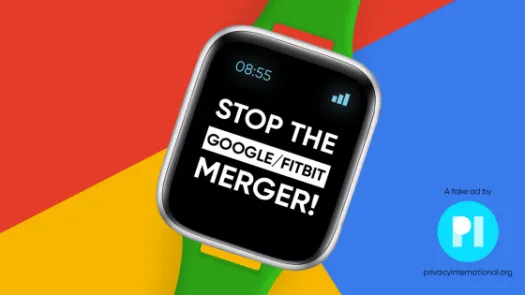
A day in the life of a GoogBit user in 2025
Let us fast forward to 2025, and spend a day in the life of Lila, a GoogBit user...
- GOOGLE wants to buy Fitbit, but what will this mean for our future? The company already has too much data about us all, and we don't want them to now grab our health data too. These sensitive data might be used to expand the tech ginat's digital dominance.
- WE fast forward to a future where your data is constantly explited for profit.
- YOU can join the 'NOT ON OUR WATCH!' campaign to stop the merger!

Monday, 16 June 2025
It’s 7:33 am. Lila’s GoogBit watch vibrates. “You got 6 hours and 57 minutes of sleep last night, including 2 hours and 12 minutes of deep sleep”, the watch reads. “In total, you tossed and turned for 15 minutes only”. Taking into account Lila’s online browsing activity, her sleep pattern, the recent disruptions in some of her other biorhythms, as well as her daily schedule, GoogBit watch has calculated the very best minute to wake her up.
GoogBit is the device Lila uses for just about everything these days – from payments at shops to public transport. Not so long ago, those devices used to be called Fitbit but hardly anyone remembers this name anymore. When Google purchased Fitbit five years ago, they turned it into GoogBit. Now everyone uses them. They are cheap and all you need to do is agree to a long and opaque privacy policy. But who has time for this nowadays? Lila does not.
"It’s 11.09am and time for your GP appointment. Last week, you looked up thrush symptoms. We have notified your doctor and health insurance company.” With cuts to healthcare services, carrying a GoogBit helps doctors keep track of their patients to minimise healthcare expenditure. With her GoogBit, Lila’s doctor can keep track of her healthy -and not so healthy- habits. Her data is uploaded to and stored in the Google Wellbeing Cloud, which your doctor and your health insurance can securely and easily access. It’s just between you, your doctor, your health insurance, Google, and its business partners.
While having lunch at work, Lila is listening to the Technology Pill. “It’s a GoogMatch!”, the GoogBit assistant whispers in Lila’s headphones. “Did you know there’ a bar close to your home where he goes every other Saturday with his friends?”. GoogMatch comes as part of Google’s family of apps; no need to even create an account. The app uses physical data from GoogBit, like heartbeat, sweat, muscle tensions and movement, to assess who Lila is really attracted to. Chances are the person she likes will also have a GoogBit and GoogMatch installed. No need for Lila to explain her sexual preferences, her browsing history says it all.
In this case, it looks like Lila stands a chance with Dan, her new colleague who is just sitting across from her. But GoogBit’s suggestions don’t stop there. GoogBit, GoogMatch and every Google product interact with each other to ensure the match is successful. For example, GoogMatch uses consumption habits, browsing history and body interactions to build a profile of what users are partial to: dogs or cats? Beatles or Stones? Pizza or burgers? Muscle jocks or next-door geeks? At the same time, GoogBit combines emotional and location data to make sure that, before she goes to bed, Lila can have one more look at the ad for this new ride-sharing app that her colleagues were talking about during lunch time.
Its 6pm and Lila’s meeting friends after work. “Alcohol? Are you sure?” Just as Lila is about to pay for her drink using her GoogBit, the payment gets declined. “You have reached your weekly alcohol consumption limit!” GoogBit warns. “If you want to proceed with the payment you need to change your settings to increase your alcohol limits settings. Your health insurance company will get notified that your new limit is over the recommended daily alcohol intake. Shake your wrist to proceed anyway.”
Lila is finally home. GoogBit senses she might be stressed. “Coming up: comfort food and a 90s-feel-good pop playlist just for you.”
It’s almost 11pm. “Time to go to bed to reach your 8-hour of sleep target!”, says GoogBit. But Lila cannot hear it over the sound of her favourite playlist. It’s now past midnight and, although she is exhausted, she wants to finish the final chapter of The Testament. “Still awake?”, whispers GoogBit. Lila ignores it and continues reading. GoogBit interrupts her five minutes later: “Thinking about Dan? Would you like GoogBit Assistant to recommend underwear based on his preference profile?”.
In fact, Lila did briefly think about Dan. As the office manager, she is in charge of organising his birthday party and she has been constantly talking about it with her colleagues. She wonders why GoogBit is trying to set her up with her male colleague and present heteronarmative choices to her, when she's actually not into men at all...
“It looks like you are having trouble sleeping. You might want to try these sleeping pills that have helped in…”. Lila turns GoogBit off. “Enough, Google”, she says while going to bed. “Enough”.
Even if we are not Fitbit users, we all need to stop and think about the implications of this merger. There is a reason that our health data is subject to higher levels of protection - its intimate, reveals vast amounts about our everyday lives, and the potential consequences if exploited can be devastating. Google should be keeping its hands off our health data.
Whilst Lila's story is still fiction, big tech companies like Google are engaging in a race to the bottom to collect ever more data. Unless this is the dystopic future we want to see, we must act now.
Sign our letter to the European Commission, asking them to block the Google/Fitbit merger.
Let's tell Google, 'NOT ON OUR WATCH!'
